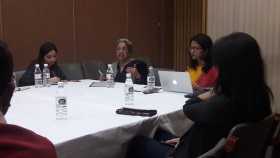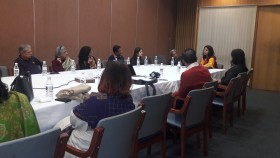The Harvard South Asia Institute (SAI) organized a focused group discussion to reflect upon the mass dislocations during the Partition of British India in New Delhi on February 3, 2017 at the India International Centre, New Delhi. Titled ‘Looking Back ‘Looking Back, Informing the Future – The 1947 Partition of British India: Implications of Mass Dislocations Across Geographies,’ the discussion was focused on facilitating a personalized dialogue about Partition. The event was a part of an ongoing SAI project to create an accessible archive to digitize the stories, records, and reflections of the 1947 Partition of British India in crowd proportions.
Meena Hewett, Executive Director, SAI, introduced the session and shared the background of the project and the ongoing efforts. She talked about Prof. Jennifer Leaning’s work on demographic and humanitarian consequences of conflict, which led to the birth of this project and shared Prof. Tarun Khanna’s (Director, HSAI) idea of collecting personal stories with regard to Partition through a crowdsourcing format. This project, she said, will not only provide crucial perspectives about the past but also be instrumental in giving insights about the future, especially with respect to the patterns of migration. Hewett invited the participants to share their impressions of the Partition and how they remember the event. She introduced the speaker and facilitator for the discussion, Prof. Uma Chakravarti, noted Historian and Professor of History.
Prof. Chakravarti deftly contextualized the project and highlighted the importance of documenting personal stories and recollections of Partition and sharing them with the community. Providing the historical background of the Partition of India, she established its importance as the largest exodus in human history and underlined the urgency of collecting stories of survivors, as very few of them remain. She also emphasized the relevance of the work in order to enrich historical knowledge and realities experienced. Prof. Chakravarti also highlighted how these stories connect us to our present and inform our understanding of history, nation, community and religion. She elaborated upon the importance of archiving and following the paper-trail in government records to understand how the events of Partition were documented. This also helps us in identifying the gaps in the narration of history. The other point of emphasis was on the significance of including stories of Partition from the Eastern border, which have largely been absent from the mainstream accounts of Partition, especially its consequences in the form of economic displacement.
 The participants were comprised of people from diverse backgrounds, each of whom had a unique interest in the Partition of India. Some of the participants had personally lived through the Partition and experienced the dislocation which was the reality for countless families on both sides of the border. Others had had access to tales of Partition as the second-generation of the migrants, through recollections of the event from family members.
The participants were comprised of people from diverse backgrounds, each of whom had a unique interest in the Partition of India. Some of the participants had personally lived through the Partition and experienced the dislocation which was the reality for countless families on both sides of the border. Others had had access to tales of Partition as the second-generation of the migrants, through recollections of the event from family members.
The sharing of personal stories included that of Mr. Kapoor who was eight years old at the time of Partition and was in Kashmir, India for a holiday when the decision of division was announced. His grandparents, who were in Pakistan and refused to move to India, were murdered by the mob even though their Muslim servant sacrificed their lives out of loyalty for them.
Another participant, Ms. Meera, shared that her grandparents in Pakistan were saved by Muslim neighbors who hid them from the marauders. She further commented that the issues of conflict do not arise between the citizens of either country but are reflective of the political differences of the governments.
In that same light, Ms. Kishwar Desai, who is curating a Partition Museum in Amritsar, talked about the importance of private memories. She shared the example of a family, which had donated the family swords which had been hidden by their grandfather at the time of Partition so that they are not used for murder. These, she remarked, are stories of loyalty and refusal to espouse violence and must be a part of public memorization of Partition.
Mr. Meghnad Desai talked about the psychological trauma of Partition, which prevented affected people from talking about their experience as they tried to move ahead with their lives. The past was too painful to be revisited. He also referred to the change observed in the second generation of migrants who are more willing to talk about it. Another participant, Ms. Prerna Makkar, talked about her father, who lived through Partition and his reticence to talk about it. She realized the intensity of its impact on him when he once started crying profusely while watching the film ‘Tamas’ and his attachment to his house in Patel Nagar, highlighting his fear of yet another dislocation.
The other themes that emerged from the discussion included: the politicization of memory, dynamics of caste within the survival camps, resilience of migrants and the need for documentation of success stories (especially those from Punjab), the idea of routinization of borders, how the memory of Partition informs the understanding of contemporary conflicts (especially apparent in the sense of betrayal that pervaded in the Sikh community after the 1984 riots), and accounts from defense personnel from British India who were confounded by the decision of which country to choose.

